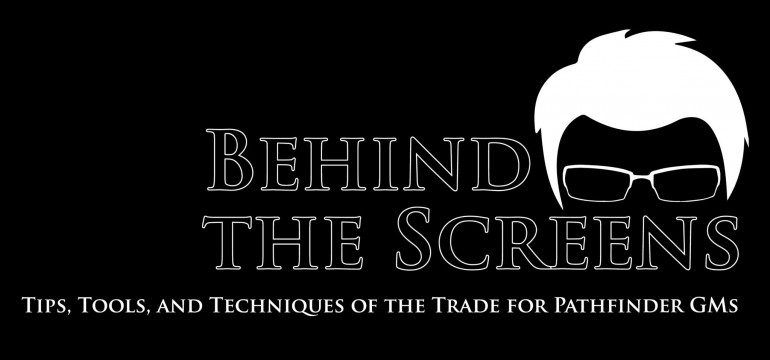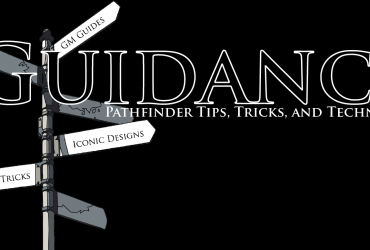Hello! I’m back! Things have been busy for me. Between figuring how to make good radio to freelance work, to my own home group games I haven’t had time to sit down and write for myself for a while. But enough excuses. We’re here aren’t we? It’s the first Behind the Screens article of the new year. So I thought it’d be fitting to center our discussion around new beginnings. Whether it’s beginning a new campaign, starting a new group, or welcoming new players into an existing group, your players are likely to look to you, as the GM, to facilitate the endeavor.
For some GMs, especially newer ones, this can be a daunting task. You can find yourself quickly bogged down with concerns like party balance, worries about personality conflicts, and player compatibility. Each of which are important considerations but only a small part of the equation. As a GM, managing inter-player dynamics shouldn’t take primacy over your other responsibilities but it often does. Nothing is quite so disappointing as getting all excited for an Adventure Path only to find out that the group doesn’t play well together at all.
So that’s why starting off your group right is so important. An early screening process can help you identify potential problem areas that might arise in the future. I’m not saying that you should have your players fill out application forms and go through an interview process (although I have heard of some groups doing this). What I’m suggesting is a Session Zero, the session before you start your new adventures — with your new campaign/group/player(s), etc…
Your focus for this intro session is going to be different based on whether or not your group has played together before. If you’re starting with a fresh group, maybe you’ve responded to a LFG post, or you’re combining players from different friend groups, your challenge will be very different than if you’re dealing with a group that’s been together for several years of more.
For a fresh group your primary concern should be how well players get along. Can they work together to accomplish challenges in potentially stressful situations? How do they feel about roleplaying with one another? Are there rookie players who aren’t comfortable with asking for rules help? Are there veterans who aren’t patient with rookies who do? For this group a Session Zero takes the form of an extended ice-breaking exercise. No. Not like trust falls and name-games. Though if that’s your thing, go for it.
Instead, I suggest sitting your players down for a cooperative board game. Games like Super Dungeon Explore, Pandemic, Castle Panic, or Sentinels of the Multiverse are ideal. Each of these games takes 30 minutes to an hour to complete, emphasize player cooperation and teamwork, and can be moderated by a single player (you!). Your goal for this is much the same as if you were GMing a roleplaying session. Make sure each player gets some spotlight, has fun, and feels good. During the game you can evaluate how well your group meshes. It can be a valuable tool to help identify problem interactions between players.
Poor personality interactions are an unfortunate reality for gamers out there. And roleplaying games are much more socially intensive than your average board game. Sometimes issues can be remedied with careful and compassionate dialogue. But other times there may be irreconcilable differences and the best solution might be to accept that these players shouldn’t be in the same group together. Either way, recognizing potential friction during the course of an hour long board game is infinitely preferable to this issue coming up in the middle of a twelve month campaign.
If you’re GMing for a group of players who already know each other or has gamed with one another before, your Session Zero might not be crucial to your group’s success. This was the case for one of my homegroups. But I still had a Session Zero. But instead of teambuilding we focused our pre-campaign (Kingmaker, in this case) session on character generation. I started out with a brief overview of the campaign setting (the River Kingdoms/Stolen Lands and Brevoy), talked about campaign expectations (half adventuring, half kingdom building), and went over my character creation guidelines (20 point buy, core races, core, base, or advanced classes only). We then spent the rest of the session bouncing character builds, backgrounds, and motivations back and forth.
Try and spend as much time with your players talking about their characters personalities and fluff as you do mechanics and numbers. Because talking about the years that Gerod spent toiling on the farmstead makes for far better story fodder than getting really excited about Gerod’s 22 Strength score. Recently I’ve tried incentivizing my players to come up with detailed backstory. I offered them 500 gp in starting wealth if they would give me at least 500 words of non-mechanics write up for their characters. Overall I would say it worked. And the ideas generated in that first think-tank style Session Zero are still informing the decisions of my PCs as the Kingmaker Adventure Path progresses.
Obviously, these are two very different approaches for different groups. You’re likely to find your experience to be somewhere in between. If that’s the case, of if you find yourself with lots of time for your first session maybe try a hybrid. Break the ice with a quick game or two. Break for lunch. And then jump right into character generation. Keep in mind that every group is unique and your mileage may vary. But I’ve had great results and I hope you do too.
Have you dabbled with a Session Zero type set up? What do you do to help break the ice for new players? Or want to share how you go about starting new campaigns? Leave it in the comments section below!






That’s a great idea! I wish I had done that with my current homebrew campaign. I have another campaign launch coming up next week, and though the first night of play is already scheduled, I think I’ll include an hour or two at the start to cover session-zero-type-of-stuff.
One thing that I would include in a session zero is some kind of informal poll, to get an idea of what aspects of getting together and playing the game are important to the players’ and gm’s enjoyment (I’ve considered writing my own post on this sub-topic over at asfh). I’m thinking of questions like:
• “How important is the physical environment of the gameroom to your enjoyment?” (comfy chairs, fridge in the room, huge vs cramped table, noise level, availability of awesome accessories like dice towers, etc.)
• “How important is the quality of terrain and/or drawn maps to your enjoyment?” (compared to in-game aspects such as the danger-level of the adventure, or roll- vs role-playing)
• “If you had to choose between playing with a group of cheerful players that floundered in-game, versus playing with a group that was perhaps less-than-cheerful, but performed fantastically in-game, which would you choose?”
Answering some questions like those might help a gm know where to focus his or her efforts. If I intended to put a bunch of effort into constructing custom terrain, but the players would barely notice, or if they admit that they’d be annoyed if I ran the initiative board poorly or got a rule wrong, that information would be useful to have before getting started.
Those are some great questions. I think vital GMing skill is the ability to get a handle on your group’s wants and needs as players and cater to them. Obviously there’s some back and forth but the idea is that you want a harmonious gaming group.
I’d also inquire what type of game your players want in terms of atmosphere. Do they want dark, grim, and gritty a la Game of Thrones or Walking Dead where everything is terrible all the time and everyone has a dark side? Or do they want happy, light, and positive like My Little Pony or Adventure Time where there are challenges and dangers but everything is going to okay in the end?
Most groups will fall somewhere in the middle or alternate between the extremes from session to session. But as good GMs it’s our job to suss out what the right mixture is.